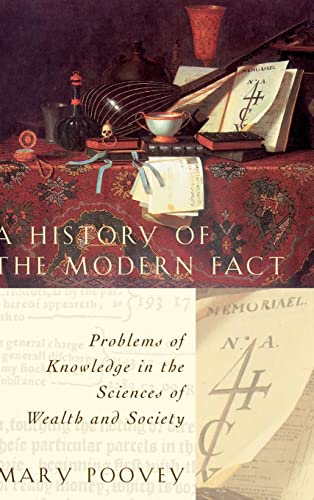Items related to A History of the Modern Fact: Problems of Knowledge...
A History of the Modern Fact: Problems of Knowledge in the Sciences of Wealth and Society - Hardcover

Synopsis
How did the fact become modernity's most favored unit of knowledge? How did description come to seem separable from theory in the precursors of economics and the social sciences?
Mary Poovey explores these questions in A History of the Modern Fact, ranging across an astonishing array of texts and ideas from the publication of the first British manual on double-entry bookkeeping in 1588 to the institutionalization of statistics in the 1830s. She shows how the production of systematic knowledge from descriptions of observed particulars influenced government, how numerical representation became the privileged vehicle for generating useful facts, and how belief—whether figured as credit, credibility, or credulity—remained essential to the production of knowledge.
Illuminating the epistemological conditions that have made modern social and economic knowledge possible, A History of the Modern Fact provides important contributions to the history of political thought, economics, science, and philosophy, as well as to literary and cultural criticism.
"synopsis" may belong to another edition of this title.
About the Author
Mary Poovey has recently retired from her position as Samuel Rudin University Professor in the Humanities at New York University. She is the author of numerous books, including A History of the Modern Fact: Problems of Knowledge in the Sciences of Wealth and Society and Genres of the Credit Economy: Mediating Value in Eighteenth- and Nineteenth-Century Britain.
"About this title" may belong to another edition of this title.
US$ 3.75 shipping within U.S.A.
Destination, rates & speedsSearch results for A History of the Modern Fact: Problems of Knowledge...
A History of the Modern Fact: Problems of Knowledge in the Sciences of Wealth and Society
Seller: HPB-Red, Dallas, TX, U.S.A.
hardcover. Condition: Good. Connecting readers with great books since 1972! Used textbooks may not include companion materials such as access codes, etc. May have some wear or writing/highlighting. We ship orders daily and Customer Service is our top priority! Seller Inventory # S_350121917
Quantity: 1 available
A History of the Modern Fact -
Seller: SecondSale, Montgomery, IL, U.S.A.
Condition: Very Good. Item in very good condition! Textbooks may not include supplemental items i.e. CDs, access codes etc. Seller Inventory # 00082325744
Quantity: 1 available
A History of the Modern Fact : Problems of Knowledge in the Sciences of Wealth and Society
Seller: Better World Books: West, Reno, NV, U.S.A.
Condition: Good. Used book that is in clean, average condition without any missing pages. Seller Inventory # 52798971-75
Quantity: 1 available
History of the Modern Fact : Problems of Knowledge in the Sciences of Wealth and Society
Seller: GreatBookPrices, Columbia, MD, U.S.A.
Condition: New. Seller Inventory # 1532742-n
Quantity: Over 20 available
A History of the Modern Fact: Problems of Knowledge in the Sciences of Wealth and Society
Seller: Kennys Bookshop and Art Galleries Ltd., Galway, GY, Ireland
Condition: New. 1998. 1st Edition. Hardcover. . . . . . Seller Inventory # V9780226675251
Quantity: Over 20 available
A History of the Modern Fact - Problems of Knowledge in the Sciences of Wealth and Society
Seller: PBShop.store US, Wood Dale, IL, U.S.A.
HRD. Condition: New. New Book. Shipped from UK. Established seller since 2000. Seller Inventory # FW-9780226675251
Quantity: 15 available
History of the Modern Fact : Problems of Knowledge in the Sciences of Wealth and Society
Seller: GreatBookPrices, Columbia, MD, U.S.A.
Condition: As New. Unread book in perfect condition. Seller Inventory # 1532742
Quantity: Over 20 available
A History of the Modern Fact - Problems of Knowledge in the Sciences of Wealth and Society
Seller: PBShop.store UK, Fairford, GLOS, United Kingdom
HRD. Condition: New. New Book. Shipped from UK. Established seller since 2000. Seller Inventory # FW-9780226675251
Quantity: 15 available
A History of the Modern Fact: Problems of Knowledge in the Sciences of Wealth and Society
Seller: Lucky's Textbooks, Dallas, TX, U.S.A.
Condition: New. Seller Inventory # ABLING22Oct1111410002497
Quantity: Over 20 available
A History of the Modern Fact: Problems of Knowledge in the Sciences of Wealth and Society
Seller: Ria Christie Collections, Uxbridge, United Kingdom
Condition: New. In. Seller Inventory # ria9780226675251_new
Quantity: Over 20 available

